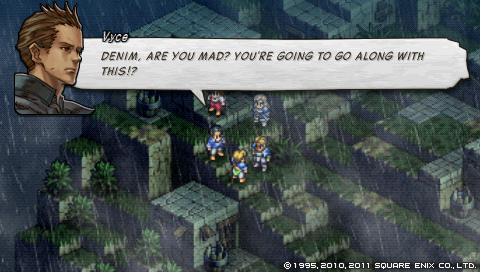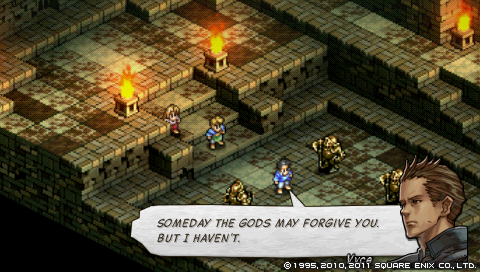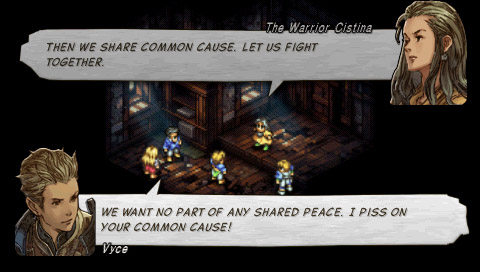WK's Top 100 Lost but Not Forgotten : Tactics Ogre: Let Us Cling Together
by , 05-24-2020 at 11:43 PM (79202 Views)
I'm always split on these articles. So many of these games are great and I have retroactively said a few of them made the list, but occasionally something comes along that I really want to love but the game just won't let me. Tactics Ogre is in a weird place for me because the remake and the original are pretty different in some meaningful ways, so much of this review pertains to the remake due to having only played a little bit of the original.
Set in the isles of Valeria, the lands were filled with strife due to ethnic tensions among the Bakram, Wallister, and Galgastani, but a man named Dorgalua of the Bakram group was able to lead his troops to victory over the others and unite the islands for the first time in eighty years. Valeria was at peace and all was well until a series of misfortune cost the Dyanst-King Dorgalua both his newborn son and his wife. Driven to despair, Dorgalua passed on not long after leaving his kingdom with no heir. Quickly the kingdom fractured on ethnic lines with Abuna Brantyn of the royal court, and of the Bakram group, seeked the aid of the foreign aid from the Holy Lodis Empire in order to secure his rule and protect his people. Galgastani was led by the Heirophant Balbatos who was stopped in his efforts against Brantyn and his allies leading to stalemate in their fighting. To gain more territory, he decided to approve of the ethnic cleaning of the weaker Wallister group led by Duke Ronwey who was quickly captured and became powerless to help his people.
After the Dark Knights of Lodis begin raising towns and kidnap his father, out hero Denam Pavel, along with his sister Catiua, and childhood friend Vyce begin to plo their revenge against the leader of the Dark Knights, Lanselot. When they try to ambush him and their guard, the group discover that their information was partially wrong. Lanselot had come, but he hailed from Zenobia and was once hailed as a hero when he helped another nameless lord overthrow a corrupt monarch. Being a good sport, and seeing this as an opportunity to make connections within Valeria as a mercenary, Lanselot and his crew help Denam to liberate Wallister's Duke Ronwey, making the trio into heroes for their people. Soon they get more tasks from the Duke as he tries to rally the Wallister forces to fight back from their expansionist and genocidal neighbors. This all accumulates into a horrible choice towards the end of the first chapter that will change the course of Denam's life and tear the trio of childhood friends apart. From here, the story begins to shift and Denam learns the hard truth of war, no matter how much you try to be a "good guy" you'll always be someone else's villain. Will Denam succeed in saving the Wallisters? Why is Lanselot of Zenobia really in Valeria? What does Lodis really want with Valeria? Finally, what is the real truth about Denam and Catiua's origins?
From just reading the very abridged run down of the first few missions of Tactics Ogre, you can tell this game is really complex in the plot department. This was the second title Yasumi Matsuno made for Quest and the game that really put his star on the map in the Japanese game development industry. After debuting with the RTS title Ogre Battle, Matsuno made some major changes to the next entry in his Ogre Battle franchise by changing both the gameplay by switching to a Tactical RPG format, and by having a heavier focus on narrative compared to the more abstract Ogre Battle. Yet it was also nice to see the team connect the two series together by bringing back characters from Zenobia and finally letting players learn more about Lodis, who were sort of a boogie man in the first game.
What is really nice is how the game retains one of the best elements from Ogre Battle which is how your choices in game start to paint how the game sees you. The defining choice at the end of the first chapter will largely pigeonhole Denam's reputation for the rest of the game and I enjoy how it changes his character arc from either being someone who is being wrongfully persecuted for their virtues or one who has to come to terms with their crimes. This may be a blasphemous statement for some, but I honestly feel Tactics Ogre has an overall better plot than Final Fantasy Tactics. While I adore Ramza and Delita's dual story, FFT was always sidelining the better human drama for it's magic stones and demons story, whereas the human drama is front and center for all of Tactics Ogre and even when it does get a bit mystical, they save it for the grand finale with a only a few minor hints here and there which I feel worked better overall. I also appreciate the multiple endings and how only one of them actually leads to an ideal ending whereas the other two pretty much end with Denam getting assassinated and the whole war starting over. Again, pointing to the fact the morality of this game falls into the "you're always someone else's enemy" no matter how noble your think your intentions are. What I also find interesting is how well Catiua plays in all of this, and how at the end of the day, the game is really more about her than Denam. Probably why the good ending is the one where she lives.
If I have to criticism the plot for anything, it may be with Vyse, who winds up taking the path you don't choose for Denam. It's not a bad idea, but his personality switch is a bit glaring depending on the choice. If you go the Law route, he's actually a reasonable and still endearing character who is simply holding Denam accountable. If you go Chaos/Neutral though, he turns totally evil and it's a bit alarming considering what he's like in the first chapter. I sometimes wonder if this drastic change was meant to sort of goad the player into going the Law route more. Yet, I ended up really liking the cast and the deep politics of the region. Matsuno had taken inspiration from the Yugoslav Wars that had dominated the news cycle in the 90s as inspiration for the conflicts. Even some nefarious elements like how some of the more sympathetic factions eventually became just as brutal and power hungry as the forces trying to wipe them out. There is a lot of humanity in the characters both good and bad and the real treat of the multiple scenarios is watching enemies from one story branch become loyal allies and vice versa. Granted, a lot of this is thanks to the new and robust translation from the remake whereas playing the original could still feel flat in places, but it's honestly the best part of the remake for me. I think what helps here is how the game does try to humanize all the characters. Even some named generics end up having elaborate backstories and call backs as you try to take territory. It may be anvilicious, but I like the fact the game tries to make you feel bad for wiping out enemy units and killing certain characters.
I wish I could say the same about the gameplay. Tactics Ogre ended up ditching it's original system which was a bit closer to FFTactics in execution, though with Ogre Battle job class mechanics, and instead tried to go with something more "user friendly" i.e. accessible to people who probably wouldn't play this genre in the first place. This ended up creating a mixed bag for me personally as the game brought in one of my least favorite elements from Tactics Advance, and that's XP and SP being rewarded at a flat rate for missions. You have no idea idea how annoying I find this and how I feel it halts any sense of progress for building a team, which for me is a big part of the addiction factor. Instead I have to keep mindlessly replaying missions just to level up classes.
This brings me to the other element I disliked which was the change in the class system. In the original, classes unlocked based on an individual unit's stats so if they had a high enough intelligence, you could turn them into a wizard or if they had a higher kill count than other units, you could transform them into a Terror Knight. In the original this made how you played battles more interesting and made going after stat cards more important. In the remake, classes are simply numerical cards you get from missions, usually from ones where the class is prevalent, and then the class is raised as a whole a la Valkyria Chronicles style, so if you get a new character, you can make them instantly useful by changing their class to one you've been leveling, but there's the rub, it means that new classes are always lagging behind, and since XP is given out in a flat rate, it becomes tiresome to try and level up new classes. The game practically tells you to just stick with starting classes and never experiment with newer ones because it's too much of a hassle to have to stop everything to grind levels for the new classes or try riskier strategies that involve leveling up a class by itself. In the good ending path, Catiua gets access to a really good class late game, but it's virtually useless for players because it still starts at level one, and skills are made way too important in this game. Now, I didn't really mind the game merging some classes together. I can imagine how annoying it would be to waste a party slot on an Exorcist class due to how often undead pop up in missions, so merging them with the Priest class was great. Likewise having the offensive Wizard merged with the Debuff/Buff Witch saves time as well but unfortunately, due to the skill system this class suffers a lot of issues because you practically have to make them a specialist in a single element to get the most mileage out of them. This brings me to my other issue...
The original didn't really have a skill system, classes had their roles and some had a few abilities but unless they were a mage, they were often just fancy sprites with a different set of numbers governing how you used them in battle. Games like FFTactics popularized the idea of a skill/customization system among the Squenix fanbase, so the game was retooled to have one. The issue is that the majority of the skills are simply augments for your character stats, which doesn't sound bad on paper until you realize the classes desperately need them to function in battle. It gets frustrating how unless a class is ridiculously over leveled, they need accuracy skills if you ever hope to see them hit anything and a damage skill to make it worth your trouble. Had the game simply stuck to giving the classes just some flavor skills to make them play differently from each other in battle for the sake of variety, I could easily look past this issue, but the fact a units stats are so tied into the skill system just makes it a pain in the ass when you combine the new class system and flat rate XP/SP mechanics on top of all of this. It was bad enough new classes start at level one, but since skills are often more important than class levels, even gaining a few levels after a few missions will still have the class too far behind to be useful, and heaven help you if you're dealing with a class that deals with both melee and magic, they are almost always garbage units because you don't have enough slots to make them good with either, so they seriously suffer from this new system. You pretty much have to decide from the beginning to make a character good with one thing and stick with it, which makes the whole system feel inflexible.
I guess my issue is that this is one of those games where the best way to play is to build a starting team and then just stick to it until the end of the game because too many of the mechanics penalize you for experimenting by forcing you to grind more than normal and until you hit a class cap, you'll never have classes catch up fast enough. Specialty classes are often more trouble than their worth, and since a lot of them tend to be dual red mage style classes, they're automatically less useful than they need to be due to the skill system prioritizing specialization over flexibility. It just made building a team far more of a chore than it had to be. Another annoying new mechanic was crafting. It was implemented as a way to hide all the best stuff in the post game where you can actually grind the same missions for the materials needed to make anything good; as well as serve as the only means to get around the poorly thought out skill system. Your characters gear is restricted by their class and its level. Crafting allows you to build gear that will often have better stats than higher gear but at a lower level cost, so you basically have to be outfitting your whole team with custom gear if you really want to make strides in the game without stopping every few story missions to grind. There is a bit of RNG at play as you start unlocking higher tier stuff, and unfortunately, what you can make is restricted to having plans which only the most basic which will get your through the story campaign is available in shops and all the really good stuff are rare drops in missions or restricted to post-game dungeons.
In a way, Tactics Ogre remake sort of fully embodies the worst practices of Squenix at the time by back loading the game too much/ Leveling a class is much easier in the post game when you can farm the same easy missions over and over again and several classes and gear are practically impossible to get until the final chapter, and even then, you'll need to grind a better party to get through them. I understand that a lot of the changes made were to help improve the fact the game was built for pick up and go gameplay much like the Tactics Advance series, but like the problem I have worth that series as well is that I find Tactical RPGs are more of a niche and frankly invested gameplay experience, so trying to fix the format for a group of people who may only play three missions a day while they're commuting is aggravating for us who don't play it like that. None of this would have likely been a problem if I hadn't started playing the original via emulation since finding a legitimate copy is an act of god if you don't want to break the bank. I honestly had more fun with it because the game played like the middle child between Ogre Battle and FFTactics, often combining my favorite aspects of each. S that largely hurt the game for me and is a large part of why this game didn't make the list.
I have a feeling that once I finish a playthrough of the original, that will actually make my list because I feel the narrative and player choice are incredible for this game and you can really see the Tactics team coming into their own with this entry, but the remake just has so many nagging issues with the gameplay that keep snowballing into bigger problems. This game could have saved itself a lot of headaches by just letting units have individual levels instead of classes. Would have saved me a lot of headaches and I prefer how the original sort of made you more invested in your individual units by specializing them isntead of the new set-up that makes it more obvious you should treat your units as expendable commodities. I do appreciate what the remake did with the better translation, additional scenarios, and I actually do like the ability to go back and replay missions from alternate paths. There is a lot of good in the remake and I'm sure most of my gripes are more personal than anything universal.



 Email Blog Entry
Email Blog Entry
